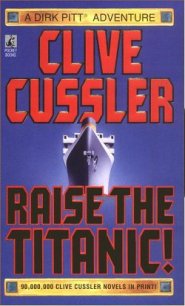The Storm - Cussler Clive (книги без сокращений .TXT) 📗
Joe sighed in frustration. He had no idea where the flatbeds could have gone. Edo’s men had to have missed something.
The major tossed the notepad aside. “Why don’t you tell us what you’re really up to?”
“I’m just trying to help,” Joe said, as close to surrendering out of frustration as he’d ever been. “Can you at least inspect the dam?”
“Inspect it?”
“Yeah,” Joe said. “Look for leaks, look for damage. Anything that might be out of the ordinary.”
The major considered this for a second, sitting up straighter and nodding. “An excellent idea.”
“It is?”
“Yes. That’s just what we’ll do.”
“We?”
“Of course,” the major said, standing and mercifully stubbing the cigarette out at last. “How will I know what to look for if I don’t bring you along?”
Joe wasn’t sure he liked this idea.
“Guards,” the major shouted.
The door opened. Two Egyptian MPs came in.
“Shackle him appropriately and deliver him to the dock. I’m taking our guest on a tour.”
As the men began to bind Joe in irons, the major spoke. “You will see that the dam is impregnable, and then we can end this charade and talk about your true purpose, whatever that might be.”
CHAPTER 50
TWENTY MINUTES LATER JOE FOUND HIMSELF IN A PATROL boat motoring quietly up the Nile in the dark. The Egyptian major gave orders while another soldier piloted the craft and a third man stood by with an assault rifle.
The night air was cool, but fortunately the rain had passed. The stars had come back out as the sky cleared. There was little traffic on the river at this hour, but the valley was lit up. Hotels and other buildings on the banks of the river virtually glowed with the illumination, as did the dam, awash in the glare of floodlights like a football stadium at night.
Because Aswan was an embankment dam made of aggregate, it blended better into the background than dams like the Hoover. Instead of a towering gray wall at one end of a narrow valley, Joe saw a huge sloping structure like a giant ramp almost the color of the desert around it.
The outside of the structure was a thin layer of concrete designed to prevent erosion. Beneath that shell lay compacted rock and sand and, in the center, a watertight clay core that led down to a concrete structure known as a cutoff curtain.
Behind the dam sat a wall of water over three hundred feet tall.
“Do we have to be on this side?” Joe mumbled.
“What was that?” the major asked.
“Couldn’t we inspect the dam from the other side or even from the top?”
The major shook his head. “We are looking for a leak, no? How do you expect to see a problem on the high side? Everything is underwater.”
“I was hoping you had some cameras or an ROV or something.”
“We have nothing like that,” the major said.
“I know a few people,” Joe mentioned, “I could probably get you one cheap.”
“No thank you, Mr. Zavala,” the major said. “We will inspect the face of the dam from here and I will show you that it is secure, and then we will discuss your lengthy incarceration for wasting my time.”
“Great,” Joe mumbled. “Just make sure my cell is far away from here.”
The patrol boat continued forward, easing into the restricted zone that stretched a half mile down river from the base of the dam.
Constructed in the sixties with Soviet help, the dam was built in two distinct sections. The western side, on Joe’s right, presented the broad sloping face. On the eastern side, past a triangular peninsula of rock and sand covered with high-tension lines and transformers, stood a vertical wall of concrete with gaps in it for the spillways. It was set back on a narrow outlet known as a tailrace, where the high-speed water that flushed through and spun the turbines reentered the river and slowed.
Joe noticed that the water in the tailrace was relatively calm at the moment. “Aren’t you generating power?”
“The spillways are open to a bare minimum,” the major said. “Maximum power isn’t needed at night. Peak demand is in the afternoon, for air conditioners and commercial lighting.”
They continued to move closer, bearing to the right-hand side and the sloping portion of the structure.
The closer they got, the easier it was for Joe to appreciate the enormity of the dam. The massive segmented ramp was wider and flatter than he’d expected. It seemed more like a mountain dropped into the river than a structure built by men.
“How thick is it again?”
“Nine hundred and eighty meters at the base.”
Nearly a full kilometer, Joe thought. Over half a mile. He began to see why the major was so confident. But Joe also knew a little about hydro engineering and he knew what he’d seen in the tank in Yemen.
The breach on the model had started up high and the collapse had proceeded from there, like a levy overtopped on the banks of the Mississippi.
“We’re not going to see anything from down here,” he said. “We need to inspect the top. We need to get teams out onto the dam itself and look for leakage.”
The major seemed exasperated.
“I had thought this would show you how foolish your efforts at wasting our time are,” he said. “I have no plans to imprison you. I was merely ‘yanking your chain,’ as you Americans like to say. But if you continue to try my patience, I will grow angry and have no choice but to …”
The major’s voice trailed off. He was looking past Joe, staring at the sloped wall of the dam. They were fifty feet away.
Joe turned. A trickle of phosphorescence could be seen where the water met the dam, turbulence where there shouldn’t be any. Water was running down the face of the dam and into the river. Not a flood, more like someone had left a spigot open somewhere high above, but there should not have been any.
“Oh no,” Joe mumbled.
“Take us closer,” the major ordered, stepping up to the front of the boat.
The driver nudged the throttles, and the patrol boat surged forward. A few seconds later they were right up against the face of the dam, two spotlights on the patrol boat’s light bar trained on the flowing water.
“It’s picking up speed,” Joe noted.
He stared upward along the sloping face as the major tilted one of the lights. An elongated snaking path led up and away from them.
“Can this be true?” Major Edo mumbled to himself. “Can this be happening?”
“I swear to you,” Joe said, “we’re in danger. The whole valley is in danger.”
The major continued to stare as if in shock. “But this is not that much,” he said.
“It’ll get worse,” Joe insisted, still looking up. “Can you see where it’s coming from?”
The major manipulated the spotlights to follow the path of the trickling water, but the trail disappeared where the lights faded.
“No,” the major said, all airs of superiority gone.
“You need to get a warning out,” Joe urged. “Get everyone away from the river.”
“It will cause a panic,” the major said. “What if you’re wrong?”
“I’m not.”
The major was paralyzed. He didn’t seem able to act.
“Unchain me,” Joe shouted. “I’ll help you look. Once we find the source, maybe we can do something about it, but at least you’ll know for sure.”
All the time they waited, the flow increased steadily. Two spigots’ worth now, turned wide open.
“Please, Major.”
The major snapped out of it. He grabbed the keys from one of the guards, unlocked Joe’s cuffs first and then the shackles around his feet.
“Come with me,” the major said, grabbing a walkie-talkie.
Joe climbed off the boat and onto the angled surface of the dam. He ran alongside the major, clambering upward and following the trail of water.
The slope of Aswan is only thirteen degrees, relatively mild unless one is running up it at full speed. After covering seven hundred feet horizontally and ninety-one feet vertically, the major was winded, and they still hadn’t found the breach.




